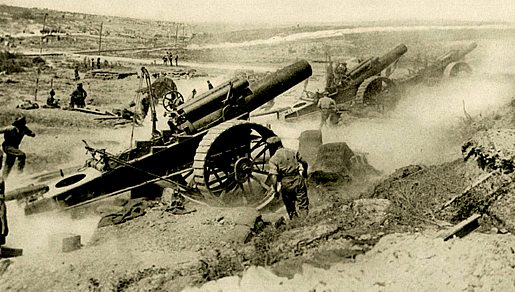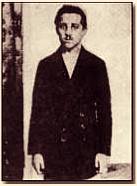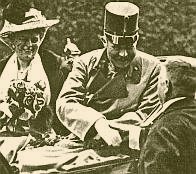This week’s edition of Dymphna’s Greatest Hits discusses the train of events that led up to the Great War in the summer of 1914. It was originally posted in June of 2005.

If Only
by Dymphna
June 19, 2005
Right Wing Nuthouse recently posted a moving look back at D-Day and the character of the American soldier which allowed us to pull victory out of a brutal and chaotic situation. From the perspective of sixty years, he looks back on that assault as the defining moment for the twentieth century, listing the many disasters which might have followed on the defeat of those soldiers hitting the beach.
In a house filled with amateur historians, the post sparked dinner table conversations that lasted for several days. Finally, the consensus came down to one incident, one date, that changed the course of the 20th century and set into play the events which were to dog the rest of our days, even down to the present.
 That moment, of course, is June 28, 1914. The incident is the assassination of Archduke Franz Ferdinand, heir to Austro-Hungarian throne, by Gavrilo Princip in Sarajevo.
That moment, of course, is June 28, 1914. The incident is the assassination of Archduke Franz Ferdinand, heir to Austro-Hungarian throne, by Gavrilo Princip in Sarajevo.
Princip was a member of an anarchist group, the Black Hand. He was one of three assassins (that lovely Arabic word), sent to Sarajevo when it was known the Archduke was to be there, invited to inspect Army maneuvers. All three of these anarchists had tuberculosis and figured they wouldn’t live long. They wanted their short lives to be useful and to that end set out for their date with destiny.
However, the prime minister of Serbia was told about the plot ahead of time and ordered the men arrested. His orders were ignored, and the men arrived in Sarajevo. If only the arrest orders had been carried out.
 The first attempt on Franz Ferdinand’s life was a grenade under the Archduke’s car as they drove from the train station to City Hall for the usual reception. However, the driver of the car saw this and managed to speed ahead, avoiding damage. Unfortunately, two people in the car following were seriously injured. Thus, after the reception the Archduke insisted on going to the hospital to see them.
The first attempt on Franz Ferdinand’s life was a grenade under the Archduke’s car as they drove from the train station to City Hall for the usual reception. However, the driver of the car saw this and managed to speed ahead, avoiding damage. Unfortunately, two people in the car following were seriously injured. Thus, after the reception the Archduke insisted on going to the hospital to see them.
It was decided that the Archduke should be escorted to the hospital on a route that bypassed the city. Unfortunately, no one told his driver. It was only as they were turning into Franz Josef Street that the Army general accompanying them noticed the mistake and had the driver back up. Guess who was at a café on the corner? Gavrilo Princip. Firing from only five feet away, how could he miss? He shot the Archduke in the jugular vein and the Archduke’s beloved wife, Sophie, in the abdomen. As he was struck, Franz Ferdinand begged Sophie to live. “Think of the children,” he implored.
The couple died at the governor’s residence. If only someone had told Franz Urban, the driver of the car, about the change in plans.
The cascade of events following their deaths was like a carefully placed set of dominoes. The players in this deadly game were as follows:
| 1. | Princip was a Bosnian Serb. It was presumed that the machinations of Serbia were behind the assassination. Thus the demands and ultimata by Austria-Hungary were on Serbia. They sent an “expert” to collect evidence. | |
| 2. | Serbia was bound to Russia by alliance and by ethnic ties. | |
| 3. | Germany was bound by its alliance with Austria-Hungary. |
Can you see the clouds gathering here? Can you see the dominoes beginning to tremble?
| 4. | Austria-Hungary demanded apologies and cessation of anti-Austrian propaganda. They wanted cooperation from Serbia in their investigations. Meanwhile, Serbia stalled. This intestinal fortitude was encouraged by word from St. Petersburg that Russia would back them. | |
| 5. | Now come Britain and France. Bound by a mutual alliance with Russia, the Triple Entente, they were obliged to come to Russia’s aid. | |
| 6. | So began the mobilization: Britain readied the fleet, France mobilized. | |
| 7. | Austria declared war on July 28th. Two days later, Russia mobilized, part of which was deployment on the German border. | |
| 8. | The Germans made an ultimatum to Russia: cease and desist. |
On July 29th, Germany proposed British neutrality. In return, the Germans would not annex Belgium or French territory. If only the British had agreed.
| 9. | On August 1st, 1914 — less than six weeks after the Archduke’s death — Germany declared war on Russia. |
And so the dominoes fell. From the invasion of Belgium to the Treaty of Versailles in 1919, the losses were massive:
| Dead | Wounded | |||
| Britain | 947,000 | 2,122,000 | ||
| France | 1,385,000 | 3,044,000 | ||
| Russia | 1,700,000 | 4,950,000 | ||
| Italy | 460,000 | 947,000 | ||
| US | 115,000 | 206,000 | ||
| Germany | 1,808,000 | 4,247,000 | ||
| Austria-Hungary | 1,200,000 | 3,620,000 | ||
| Turkey | 325,000 | 400,000 | ||
The direct and indirect costs of the war, estimated in the 1940s, were about $332,000,000,000. That’s billions. In today’s dollars such numbers are incalculable.
The Great War of 1914-1918, the War to End All Wars, was the cultural equivalent of the Black Death. Its demographic deadliness lies in its victims: mostly fit young men. The war destroyed the “seed crop” of the next generation and divided our times into a Before and After, just as the Black Death had done for the 14th century.
But the numbers don’t tell it all. The most significant event triggered by Gavrilo Princip was not the Great War itself, but the Bolshevik Revolution, which ushered in the brief but deadly Age of Socialism. Socialism was in the air anyway, and would have taken its turn on the world’s stage. But the particularly virulent form midwifed by Lenin in the Soviet Union depended entirely on the immediate circumstances of the Great War.
In 1917, If only the German high command had not made the strategically brilliant move of sending Lenin to the Finland Station in a sealed train. If only if Russia had not suffered the particular reverses it did on the Eastern Front; if only the United States had entered the war earlier rather than later…If… if… if…
Timing was all, and timing led to the ascendancy of socialism. All the murderous totalitarian tyrannies of the 20th century — Fascist, Nazi, and Communist — were socialist in nature. One hundred million or more souls perished, directly or indirectly, as a result of socialism. Whether tortured and murdered in the camps, starved to death in deliberately engineered and accidental famines, or killed in the wars brought on by the dictators, the victims at the hands of the 20th century were, by and large, the victims of socialism.
Timing was all and timing allowed Gavrilo Princip his brief moment. Without that, there would have been no punitive Treaty of Versailles. Hitler would have remained a nobody. Lenin’s arrival in Russia would not have been so opportune, thus deflecting from their courses Stalin, Mao, Pol Pot, Castro and Guevara.
The 20th century began with Gavrilo Princip in June of 1914. It ended with Osama bin Laden in September of 2001. In Europe and all the territories of the Great War, socialism is on life-support. In America, a few ignorant souls call for its renewal.
Let us pray.

I have always found the causality leading to the beginning of the First World War fascinating in the same way as a Greek tragedy; it was the twilight end of Western civilization, and the end of Western self confidence and belief in it’s cultural and moral superiority. To me, it seems that even among those who are amateur historians the First World War is not very well known or understood due to being overtaken by the Second World War and the rise of communism and the Cold War, etc. But key to understanding the modern world and the downfall of the West is understanding the causes and consequences of WWI.
Another tragic tale that directly contributed to ensuring the First World War would be even bloodier and more distastrous for the future of the 20th century is the story of the pursuit of German Imperial Navy cruisers Goeben and Breslau across the Mediterranean in the opening hours of the First World War and their escape through the Dardanelles to the Ottoman Empire. It is a similar tragedy of errors and bungling that led to the Ottomans deciding to enter the war, and entering the war on the side of the Central Powers with all the repercussions for the eventual downfall of the Ottoman Empire and the disastrous sequence of events leading to the mess that is the modern Middle East.
Did you know that Churchill sayed in 1913 that war will broke out in 1914?
Did you know that the German Kaiser was called a Peacemaker in the USA before the war?
Did you know that the german Kaiser send a Diplomat to Russia for peace but “the good guys” were faster and bring Russia to war?
Did you know that Lenin also get help from the USA?
Did you know that the Winners betrayed Germany?The sayed:Ok we accept this and this and this when you stop the war.Germany stopped and they broke their word!Also they didnt let food into germany(AFTER THE WAR!!!)and even UK Newspapers reported that 100000 germans died(other say much more).
But at the end we came always to Muslims haha…The Socialdemocratic German Newspaper from the SPD reported about the Maroccan Soldiers who were stationed in Germany.And its the same like today!Teachers sayed that they cant go out with the class because they grab the girls!
And even British sayed that its a shame,bad etc. to station Mar. in Germany…
Nowithstanding de mortuis nihil nisi bonum, this article from 2005 does not appear to address the insights of the great US historian, the now deplatformed Harry Elmer Barnes. As Ron Unz told us recently, there is a long list of US writerssuppressed after 1945 by now:
https://en.wikipedia.org/wiki/Harry_Elmer_Barnes (the Wikpedia entry is a not atypical hasbara hit job).
Nor for example the circumstances around the Stanford Hoover War Library which locked up apparently vital WW1 papers until 1941 after hundreds of thousands of documents had been shipped to the USA by Herbert Hoover after his 1,000-man retrieval squad had swarmed out all over Europe.
Nor how it is that Lord Alfred Milner is not a household name or why villagers attempting to rescue the drowning Lord Kitchener, head of the British Army, in 1916 were threatened at gunpoint by British Navy sailors.
See the very readable:
“Hidden History; the secret origins of the First World War” and
“Prolonging the Agony: how the Ango-American Establishment deliberately extended WW1 by 3 1/2 years” by Macgregor and Docherty, 2013 and 2017.
A great post. It reminded a this I saw a few years back. It makes more sense now:
https://www.economist.com/eastern-approaches/2010/11/20/if-wwi-was-a-bar-fight
Germany, Austria and Italy are standing together in the middle of a pub when Serbia bumps into Austria and spills Austria’s pint. Austria demands Serbia buy it a complete new suit because there are splashes on its trouser leg. Germany expresses its support for Austria’s point of view. Britain recommends that everyone calm down a bit.
Serbia points out that it can’t afford a whole suit, but offers to pay for the cleaning of Austria’s trousers. Russia and Serbia look at Austria. Austria asks Serbia who it’s looking at. Russia suggests that Austria should leave its little brother alone. Austria inquires as to whose army will assist Russia in compelling it to do so. Germany appeals to Britain that France has been looking at it, and that this is sufficiently out of order that Britain should not intervene. Britain replies that France can look at who it wants to, that Britain is looking at Germany too, and what is Germany going to do about it?
Germany tells Russia to stop looking at Austria, or Germany will render Russia incapable of such action. Britain and France ask Germany whether it’s looking at Belgium. Turkey and Germany go off into a corner and whisper.
When they come back, Turkey makes a show of not looking at anyone. Germany rolls up its sleeves, looks at France, and punches Belgium. France and Britain punch Germany. Austria punches Russia. Germany punches Britain and France with one hand and Russia with the other. Russia throws a punch at Germany, but misses and nearly falls over. Japan calls over from the other side of the room that it’s on Britain’s side, but stays there. Italy surprises everyone by punching Austria.
Austria Australia punches Turkey, and gets punched back. There are no hard feelings because Britain made Austria Australia do it. France gets thrown through a plate glass window, but gets back up and carries on fighting. Russia gets thrown through another one, gets knocked out, suffers brain damage, and wakes up with a complete personality change. Italy throws a punch at Austria and misses, but Austria falls over anyway.
Italy raises both fists in the air and runs round the room chanting. America waits till Germany is about to fall over from sustained punching from Britain and France, then walks over and smashes it with a barstool, then pretends it won the fight all by itself. By now all the chairs are broken and the big mirror over the bar is shattered. Britain, France and America agree that Germany threw the first punch, so the whole thing is Germany’s fault. While Germany is still unconscious, they go through its pockets, steal its wallet, and buy drinks for all their friends.
Context is key, sir, which you completely ignore. Delusion follows.
Well, let’s say, in Russia then there was a completely rotten through political system.
If the elite were less stupid and greedy and had a meaningful domestic and foreign policy, tragedy would not have happened.
I once read that when the first assassination attempt in Sarajevo failed that the Prince wanted to leave but that the CO of the Austrian demanded that the Prince stays. Then the Prince said: “They want to see me dead.”
According to this article the Prince was known to be a peace maker and in the way of the hawks of the Austro-Hungarian court. Add to this that his marriage was not approved (he married down too much) and there were more People who wanted to see him dead.
@marco on December 16, 2019 at 7:12 pm said:
> Did you know that Churchill sayed in 1913 that war will broke out in 1914?
Did you know that in 1888 Bismarck said:
“One day the great European War will come out of some damned foolish thing in the Balkans.”
He also said “20 years after I’m gone, it will all be over” (referring to the German Empire). The Empire fell in November 1918, 20 years and one month after Bismarck’s death.
and moreover, leading british and french military said after the Versailles treaties that its stipulations will lead to another war 20 years later. (Which happened through the rise of Hitler, unthinkable without Versailles).I can not recall who said this.
If I am right it was Marshal Foch who said this.
“This is not a peace treaty, this is a cease fire for twenty years.”
If only; they had listened to the Lord and obeyed Him instead of listening to themselves.
My Dad said that in England when the First World War was declared, people were out on the streets cheering. They thought they would have no problem defeating the enemy. It would all be over by Christmas.
But when the Second World War was declared, no one cheered. This time they knew what war was like.
I am reminded of the quote by Sir Edward Grey on the eve of war in Great Britain. He said: ‘The lamps are going out all over Europe, we shall not see them lit again in our lifetime’.
The whole futility and sheer tragic waste of lives of the flower of an entire generation is to me, encapsulated in that one quote. He was far more prescient than he ever could have imagined.
Read the Book The Sleepwalkers: How Europe Went to War from Christopher Clark. Events described day after day there
Russians wanted War, France also as revenge for 1871. Austria had a clear casus belli with Serbia. Apart from the Brits, Germany was the last of the above mentioned mobilizing its army to the borders. WWII was Germanys fault. But not WWI